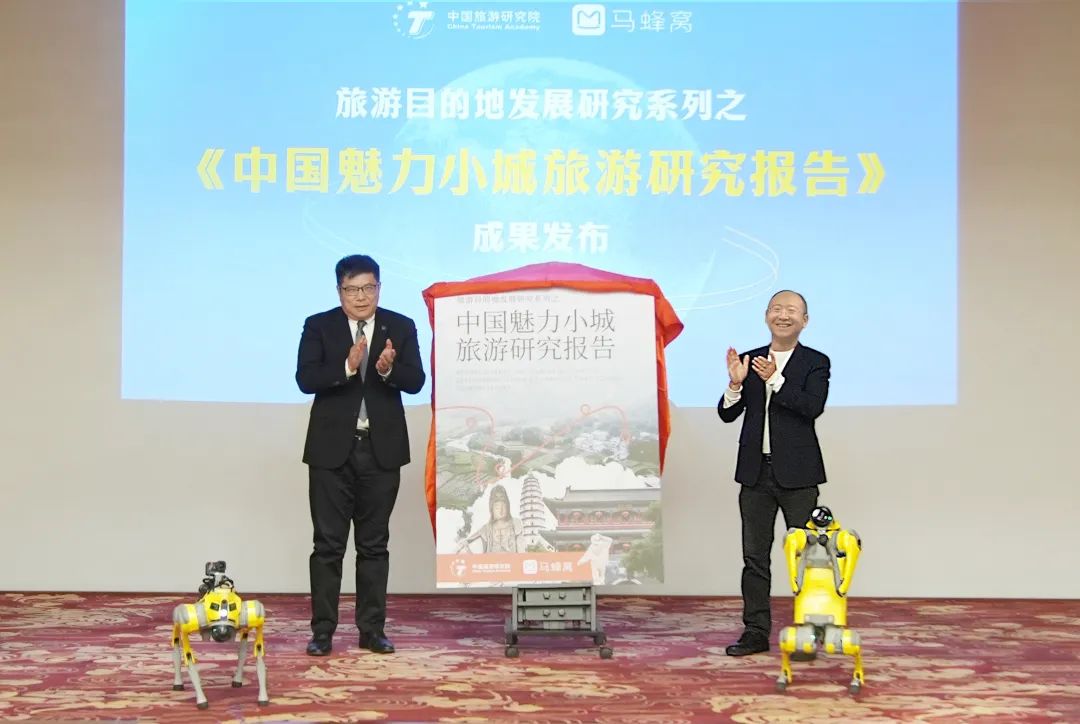On February 26, the China Tourism Academy and Mafengwo jointly held the "Tourism Destination Development Innovation Research Cooperation and Results Release Conference" in Beijing, launching the "China Charming Small Town Tourism Research Report" and 100 county-level tourist destinations favored by tourists, to help build famous tourist counties in the new stage of comprehensive development of mass tourism. Representatives from the cultural and tourism systems of Rongcheng, Shandong, Xiangshan, Zhejiang, and Leishan, Guizhou, as well as dozens of media such as Xinhua News Agency, China National Radio, China Culture News, and China Tourism News attended the conference and conducted in-depth discussions on the methodology of county economic development and characteristic small town destination construction.
In his speech, President Dai Bin pointed out that since entering the new era, the market has begun to sink, consumption has tended to be diversified and personalized, and a number of small but exquisite, small but beautiful, and small but warm tourism projects have emerged. The high-cost-effective tourism products in the sinking market have attracted a large number of tourists to visit, and tourism consumption has become more rational. Tourists are more pursuing a sense of relaxation in life that is anti-involutionary. From "pleasing others" to "pleasing oneself", tourism presents more "emotional consumption" characteristics, niche tourist destinations have emerged, and tourists prefer niche and personalized consumption methods. In the era of comprehensive development of mass tourism, we must vigorously develop inclusive tourism, cultivate and develop new quality productivity in the tourism industry, and build a modern tourism system in combination with the characteristics of the tourism industry in the new development stage.
In his speech, Mafengwo founder and CEO Chen Gang pointed out that the "China's Charming Small Town Tourism Research Report" jointly released with the China Tourism Academy is a deep insight into current travel trends and a return to thinking about the "essence of travel" - people are eager to encounter reality, perceive culture, and heal their body and mind during their travels, and thousands of small towns in China carry this expectation.
During the results release session, Dai Bin, President of the China Tourism Research Institute, and Chen Gang, founder and CEO of Mafengwo, jointly unveiled the "China's Charming Small City Tourism Research Report".

Dr. Huan Meili from the Data Analysis Institute of the China Tourism Academy delivered a keynote speech entitled "The Evolution of Tourism Destinations in the New Era". She pointed out that due to multiple factors such as tourists actively avoiding popular cities, outstanding cost-effectiveness, and proactive actions by destination government departments, low-tier cities have frequently become popular, and the turning point of narrowing the gap between high-tier and low-tier cities may have appeared. The sinking markets such as small and medium-sized cities, central towns, and key villages in developed areas are emerging tourist destinations, a growing source of tourists, and the market foundation for the sustainable development of the tourism economy. The popularity of small-town tourism is rising rapidly, becoming a new blue ocean in the tourism market.
During the roundtable discussion, Sun Yunlei, director of Mafengwo Destination Research Institute, had a special exchange with Sai Liying, member of the Party Leadership Group and deputy director of Rongcheng Municipal Culture and Tourism Bureau of Shandong Province, Lu Lu, deputy director of Xiangshan County Culture, Radio, Television, Tourism and Sports Bureau of Zhejiang Province, Yang Teng, member of the Party Leadership Group of Leishan County Culture, Sports, Radio, Television and Tourism Bureau of Guizhou Province, and Hong Runlei, manager of Unknown Travel Lab and producer of "Dun Ge Xiao Cheng". The guests discussed various aspects of the treasure town, including its resource characteristics, development positioning and innovative practices.
Contributor | Data Analysis Institute Editor | Liu Xin Source | China Tourism Academy (Data Center of the Ministry of Culture and Tourism) Please indicate the source for reprinting